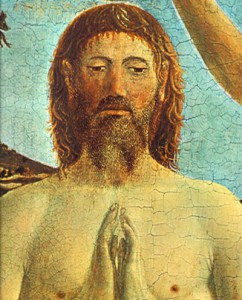
Scott Hahn with David Scott
Though we be “but dust and ashes,” we can presume to draw near and speak boldly to our Lord, as Abraham dares in today’s First Reading.
But even Abraham—the friend of God (see Isaiah 41:8), our father in the faith (see Romans 4:12)—did not know the intimacy that we know as children of Abraham, heirs of the blessings promised to his descendants (see Galatians 3:7, 29).
The mystery of prayer, as Jesus reveals to His disciples in today’s Gospel, is the living relationship of beloved sons and daughters with their heavenly Father. Our prayer is pure gift, made possible by the “good gift” of the Father—the Holy Spirit of His Son.
It is the fruit of the New Covenant by which we are made children of God in Christ Jesus (see Galatians 4:6-7; Romans 8:15-16).
Through the Spirit given to us in Baptism, we can cry to Him as our Father—knowing that when we call He will answer.
Jesus teaches His disciples to persist in their prayer, as Abraham persisted in begging God’s mercy for the innocent of Sodom and Gomorrah.
For the sake of the one just Man, Jesus, God spared the city of man from destruction (see Jeremiah 5:1;Isaiah 53), “obliterating the bond against us,” as Paul says in today’s Epistle. On the Cross, Jesus bore the guilt of us all, canceled the debt we owed to God, the death we deserved to die for our transgressions.
We pray as ones who have been spared, visited in our affliction, saved from our enemies.
We pray always a prayer of thanksgiving, which is the literal meaning of Eucharist. We have realized the promise of today’s Psalm: We worship in His holy temple, in the presence of angels, hallowing His name.
In confidence we ask, knowing that we will receive, that He will bring to completion what He has done for us—raising us from the dead, bringing us to everlasting life along with Him.
Pope Benedict XVI
from Angelus Address, July 25, 2010
This Sunday’s Gospel presents Jesus to us absorbed in prayer, a little apart from his disciples. When he had finished, one of them said to him: “Lord, teach us to pray” (Lk 11: 1).
Jesus had no objection, he did not speak of strange or esoteric formulas but very simply said: “When you pray, say: “Father’ “, and he taught the Our Father (cf. Lk 11: 2-4), taking it from his own prayer in which he himself spoke to God, his Father. St Luke passes the Our Father on to us in a shorter form than that found in the Gospel according to St Matthew, which has entered into common usage.
We have before us the first words of Sacred Scripture that we learn in childhood. They are impressed in our memory, mould our life and accompany us to our last breath. They reveal that “we are not ready-made children of God from the start, but that we are meant to become so increasingly by growing more and more deeply in communion with Jesus. Our sonship turns out to be identical with following Christ” (Benedict XVI, Jesus of Nazareth [English translation], Doubleday, 2007, p. 138).
This prayer also accepts and expresses human material and spiritual needs: “Give us each day our daily bread; and forgive us our sins” (Lk 11: 3-4). It is precisely because of the needs and difficulties of every day that Jesus exhorts us forcefully: “I tell you, ask, and it will be given you; seek, and you will find; knock, and it will be opened to you. For every one who asks receives, and he who seeks finds, and to him who knocks it will be opened” (Lk 11: 9-10).
It is not so much asking in order to satisfy our own desires as, rather, to keep a lively friendship with God who, the Gospel continues, “will give the Holy Spirit to those who ask him!” (Lk 11: 13). The ancient “Desert Fathers” experienced this, as did contemplatives of all epochs who became, through prayer, friends of God, like Abraham who begged the Lord to spare the few righteous from the destruction of the city of Sodom (cf. Gen 18: 21-32).
St Teresa of Avila addressed an invitation to her sisters with the words: we must “beseech God to deliver us from these perils for ever and to keep us from all evil! And although our desire for this may not be perfect, let us strive to make the petition. What does it cost us to ask it, since we ask it of One who is so powerful?” (Cammino, 60 (34), 4, in Opere complete, Milan 1998, p. 846) [title in English: The Way of Perfection].
Every time we say the Our Father our voices mingle with the voice of the Church, for those who pray are never alone. “From the rich variety of Christian prayer as proposed by the Church, each member of the faithful should seek and find his own way, his own form of prayer… each person will, therefore, let himself be led… by the Holy Spirit, who guides him, through Christ, to the Father” (Congregation for the Doctrine of the Faith, Letter to the Bishops of the Catholic Church on some aspects of Christian meditation, 15 October 1989, n. 29; ore, 2 Jan. 1990, p. 10).
